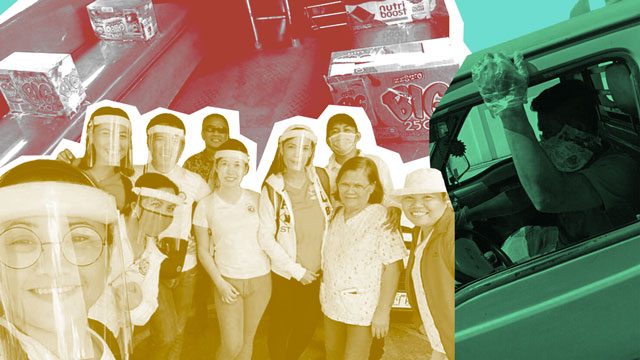SUMMARY
This is AI generated summarization, which may have errors. For context, always refer to the full article.

MANILA, Philippines (UPDATED) – As the number of coronavirus infections in the country continue to rise, many rush to pharmacies and drug stores, depleting stocks of face masks and alcohol to guard against disease.
In some parts of the Philippines, the growing scarcity of face masks has affected even frontliners in the health sector, who have no stocks of their own to use during their shifts. But Filipinos, ever resourceful, have found ways to keep safe amid the pandemic. (READ: Filipino bayanihan spirit shines through amid coronavirus outbreak)
In a Facebook post on Sunday, March 15, post-grad intern Rhona MacEachen shared how there were no more stocks of face masks available at the West Visayas State University Medical Center (Don Benito) in Iloilo City for frontliners. She added how some might be forced to wear washable face masks instead.
The scarcity has pushed doctors and health frontliners in West Visayas State University Medical Center and other Iloilo public hospitals to make improvised reusable face shields from acetate plastic sheets and elastic bands.
Hoping to help frontliners who might be exposed to patients with the coronavirus disease, MacEachen and her fellow post-grad interns at West Visayas State University called for donations to make more of these improvised face shields.
As of March 17, they were able to gather funds to purchase materials good for around 550 pieces to be made into face shields by post-grad interns at West Visayas State University and from Capiz.
“We are all overwhelmed by your support…We will be sharing these blessings to hospitals and doctors all across Iloilo and possibly the nation! We will try to extend our products to washable masks, gloves, and vitamins for our frontliners! We in the medical field have hearts full of love from all of you,” MacEachen said.
Meanwhile, UP Visayas students, who were left stranded due to the community quarantine imposed in their area, are making improvised face shields for health professionals in Iloilo.
With funds and materials from a private hospital and the Philippine College of Physicians Visayas Chapter, the students were able to create more than 100 face shields out of acetate, foam, tape, and a stapler.
In the surfing capital of the Visayas, Brandale Balid, a talented board shaper and native Boronganon, repurposed his crafting and design skills into creating cheap personal protective equipment (PPE).
Along with the Surf Riders Club, they’re eyeing to produce 100 of these face shields to help fellow Filipinos during this crisis.
Businesses like Printfinity Graphics Design and Print Solution are also doing their part in giving face shields to the frontliners.
Aside from face masks, other Filipinos explored different ways to protect their fellow kababayan in light of the coronavirus pandemic.
In the municipality of Salcedo, Eastern Samar, local government officials have installed handwashing stations at the entrances of all municipal buildings, wet and dry markets, transport terminals, and other strategic points in the area.
Its local health unit has also constructed a sanitized triage and improvised protective gear using acetate to protect both patients and frontline health personnel from infection.
At SSS Legazpi, acetate is also used as improvised plastic barriers to protect against the spread of COVID-19, the coronavirus disease. The chairs are also blocked off to ensure social distancing.
LOOK: At SSS Legazpi, acetate is used as improvised plastic barriers vs #COVID19PH. Some chairs are also blocked off to ensure social distancing as a precautionary measure. Photos from Jeanette Torallo-Mapa pic.twitter.com/rrauQEssTB
— MovePH (@MovePH) March 16, 2020
Even in jeepneys, driver Federico Tiozen Jr. has found a way to repurpose old juice boxes to encourage distance between passengers.
SHOUTOUT KAY KUYA DRIVER.
To ensure social distancing amid the #coronavirus outbreak, jeepney driver Federico Tiozen Jr repurposed juice boxes to separate passengers. pic.twitter.com/aTU2J1xS3q
Some people have had to resort to extreme measures to keep safe though. This driver used a diaper as a makeshift face mask, and some plastic gloves to get around safely during this pandemic.
Face masks are important in containing the spread of COVID-19, which is most commonly spread through respiratory droplets. As those that come into contact with the infected, our frontliners are most in need of face masks. (READ: What you need to know: Coronavirus cures, vaccines being tested)
These improvised equipment, along with the other commercially available personal protective equipment should be discarded properly.
In an explainer by This Week in Asia, consultant Wong Chen Seong said that improperly discarded masks have a large amount of secretions and may be a health hazard to others who may come into contact with them.
Want to help? Here are some ways to reach out to your communities while keeping safe. – Rappler.com
MovePH, the civic engagement arm of Rappler, is here to help communities. We’ve collated a list of groups providing transportation services for frontliners, and helpful information about the Luzon lockdown. For updates, advisories, and explainers on the coronavirus, head here.
Add a comment
How does this make you feel?
There are no comments yet. Add your comment to start the conversation.